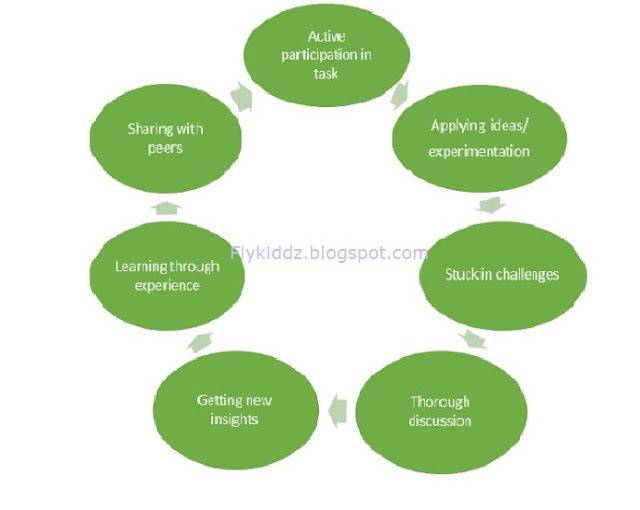Experiential Learning in schools is freehand learning experience through self doing and active participation. It involves learning through creative arts, music, organised games, playful methods, going to field trips etc. This kind of self-exploration is nothing but self-discovery and self-awareness for children. The trial and error method develops logical thinking and aims at continuous improvement in eye-hand coordination and observation skills. The children are assigned such tasks in school which are outside traditional classroom settings.
Experiential learning in schools
The process involves the following steps:
- Mentors asking kids how to do a particular task or how to improve upon the tasks already done.
- This wakes up the thought process of children. They build their own concepts and strategy and implement them to the task in hand.
- In such learning, the kids experience both success and failure alike because the challenges are immense. They think aloud if trapped in any situation or use their brain to solve a problem.
- If stuck at any point there is a thorough discussion with a mentor and among students. It is like a question and answers session focusing more on the process rather than the result.
- The new insights facilitate new experience analysing the problem in a new light.
- The curiosity, inquisitiveness and new approach to problem-solving generates excitement, boosts confidence and sharing of ideas with the peer group.
 |
| Experiential learning in schools |
Examples that are being followed in schools to make learning fun and real-life experience:
- making collage and greeting cards using chart papers ice cream sticks and other decorative items
- live cooking experiences for little chefs which familiarise them with culinary art and inculcate healthy eating habits
- dividing twelve months into twelve different themes for learning say if the theme of the month is animals-domestic, farm and wild then the method may involve making models or recognising, cutting and pasting animal pictures to explain their characteristics, visiting the nearest pet shop so that children can see, touch and associate pets with their learning.
- If the theme is marine creatures then each child may imitate as one of the sea animals and explain its features. Besides, they might go on tour to aquarium shop or breeding places of water creatures.
- The nature theme is one of the most popular and explored the subject in schools. The activities involve sowing of seeds, germination and sprouts to watering of plants, cleaning pots, visiting fruit orchards or nearby vegetable vendors, recognising fruits and vegetables and their benefits.
- If the theme is banking then the banking environment is simulated. Children learn how to operate ATM machines and carry money transactions. They understand the meaning of deposit, withdrawal etc.
Pros and cons of experiential learning:
- The multiple learning reinforces the rich learning experience
- Promotes emotional and social development
- Cultivates adventurous spirit and never give up attitude
- Children discover hobbies and areas of interest accidentally while doing repetitive but varied tasks.
- Learning from previous experiences reduces the chances of mistakes in similar types of tasks in future.
- It is a paradox that away from books cultivates reading habit in children. They try to read more to confirm their practical experiences
- Sharing of experiences helps teachers to frame guidelines and methodology for teaching.
Experiential learning is a way for future learning.....😊
Provide your feedback on experiential learning in schools in the comment section.
Comments
Post a Comment